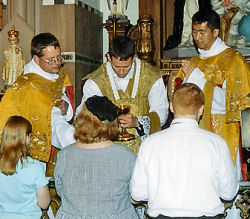 |
 |
August 5, 2006
The Most Reverend Edward K. Braxton, Ph.D., STD
Diocese of Belleville, IL
Your Excellency:
 An
article about your Pastoral
Letter of June 4, 2006 appeared in this week’s Catholic Telegraph,
the archdiocesan newspaper of Cincinnati, where I live. I have just scanned
through the article on your website, and I wanted to say thank you for
your thoughtful, comprehensive overview of the post-Conciliar Church,
and of your diocese. Your deep pastoral concern for your flock radiates
from every sentence of your letter.
An
article about your Pastoral
Letter of June 4, 2006 appeared in this week’s Catholic Telegraph,
the archdiocesan newspaper of Cincinnati, where I live. I have just scanned
through the article on your website, and I wanted to say thank you for
your thoughtful, comprehensive overview of the post-Conciliar Church,
and of your diocese. Your deep pastoral concern for your flock radiates
from every sentence of your letter.
That said, I would like to share my limited perspective with you about this “decline of Common Meaning,” as you so accurately put it, with which the Church has struggled for the past 40 years. I was born Catholic in 1951, raised Protestant after my parents divorced in 1956, and returned to the Church in 2000. I missed the radical changes in liturgy after Vatican II and all the other upheavals, and have only read about them – though I see them continue in the present. During RCIA and afterward, I attended Mass regularly and was quite happy with it – that is, until I went to my first Indult Mass in 2002.
My reaction to the old Rite was to sit there in tears and wonder why in the world the Church would abandon such beauty and mystery, such intricate depth – I can’t even find words to describe it. I left thinking “Now THAT was a Catholic Mass!” I could immediately intuit, from my Protestant background, that the Novus Ordo was in fact a heavily Protestantized liturgy, even though it is a vast improvement over the barren and banal Protestant “services” I had attended for most of my life.
Since this experience, I have attended both Masses, read much traditionalist literature about the troubling circumstances of the creation of the Vatican II documents, and the even more disturbing circumstances of Bugnini’s Consilium. I have come to the conclusion, poorly informed though it may be, that your “decline of Common Meaning” is due to nothing else than the fact that Vatican II was never implemented. Instead, a spurious and devious ideological agenda known as the “spirit of Vatican II” descended upon us, designed to secularize, individualize, balkanize, politicize, “feminize,” dissipate, and otherwise harm the Church. The Novus Ordo, if the traditionalists are correct, is the subtle cornerstone of that spurious agenda.
Your letter acknowledges that the pre-Vatican II Church “lived in a culture in which our unity was manifest in a high degree of uniformity.” In other words, a culture which revolved about and was bound to its Common Meaning. Yet you also seem to dismiss those who prefer the Tridentine Mass – the Mass of that era, and of many eras before it - as a fringe group.
My question to you is this: was not the Tridentine Mass the primary vehicle, especially for the laity, which preserved and nurtured that uniformity and Common Meaning? And if that is true, would not its free restoration work to restore Common Meaning – Catholic Identity - much more dramatically than these endless tinkerings and GIRMS necessitated by the Novus Ordo?
I have heard it often said, in defense of the new Mass, that it too can be celebrated “reverently.” But that is not the issue. Lambs and chickens can be sacrificed “reverently” by pagans. Ingredients can be added to the cauldron “reverently” by Wiccans. The issue is not reverence but sacred mystery – which the Tridentine invokes – vs. affirmation of our “status” as the “People of God” – which the Novus Ordo evokes. One is entirely inward, the other is entirely outward. Consecration vs. fellowship, invocation vs. evocation. One might even say, Catholic vs. Protestant.
I am not one of those who would advocate for the suppression of the new Mass in favor of the old (even if I were, what influence would I have?). However, I would be willing to bet that, were both Masses freely offered — and the implementation of the “Indult” has not exactly been “free” - you would find the laity gradually flocking to the old and abandoning the new. Why? Because we are far hungrier for truth, for sacred mystery, for tradition, and for beauty than for “full, conscious and active participation.” I believe Common Meaning (I prefer “Common Mystery”) can be restored by the former. The latter has had its turn for 40 years, and, as you point out indirectly, has utterly failed. Miserably failed.
Those who yearn for the old Mass do not do so out of some silly nostalgia, as so many have tried to insinuate. No, they do so because it is the very calling of their souls. It is not an act of disobedience to prefer this Mass; it is a devout prayer for salvation.
In the Diocese of Covington, KY, right across the Ohio River, Bishop Roger Foys celebrates the Tridentine Mass himself every Sunday in the Cathedral at 12:15. I go as often as I can for nourishment. I don’t know if you do the same in your diocese, but if not, I prayerfully ask you to consider it. I think that, in your heart of Catholic hearts, you will be delighted with the results.
May the Mysterium Fidei, the true heart of Common Meaning, always nourish and preserve your diocese, and faithfully bind you and your flock to Our Lord and Our Lady.
In Him,
John Ingram
17 Sleepy Hollow Lane
Cincinnati, OH 45244
513-965-8019